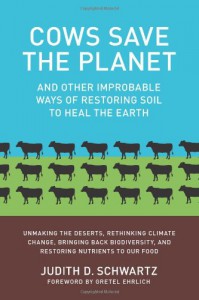Reflections
Eager reader of history, mystery, classics, biographies, steampunk, lit fic, science, scifi, and etc. My reviews are mostly positive--I rarely finish or write about books I don't enjoy. My TBR is too high for that.
Soil reverses climate change? Science made accessible, exciting, hopeful, and entertaining,

To paraphrase a sentence in the author’s introduction, if anyone had told me I’d be reading about soil, much less be fascinated and excited about it, I’d have said they were crazy, but I was so engrossed in this lively, hopeful book that I read it all in one day. There is a lot of science, but it’s easy to follow, and there are brief but interesting bios of the varied people--from farmers to researchers--the author met with to learn more about the subject.
Among the things I discovered about soil is that when it is robust it pulls carbon dioxide out of the air, reducing greenhouse gasses, slowing climate change, and enriching itself in the process so that food grown in it has more nutritional value. Instead of merely “wrecking the world more slowly” by persuading polluters do less polluting, we could also take a positive step by increasing the capacity of soil to hold carbon. And it’s not that complicated. The statistic that says it takes a thousand years to generate an inch of topsoil is referring to geological weathering, but topsoil can be much more quickly increased by other, mostly low tech methods, like altering farming and animal grazing practices. (The author step by step dismantles the popularly held belief that cows contribute significantly to global warming, showing instead that grazing animals can improve soil when intelligently managed.)
Packed with important information presented in an entertaining style, I wish Cows Save the Planet was required reading for policy makers around the world. If you’re interested in the environment or the quality of your food this may be a book you will love.
 1
1


